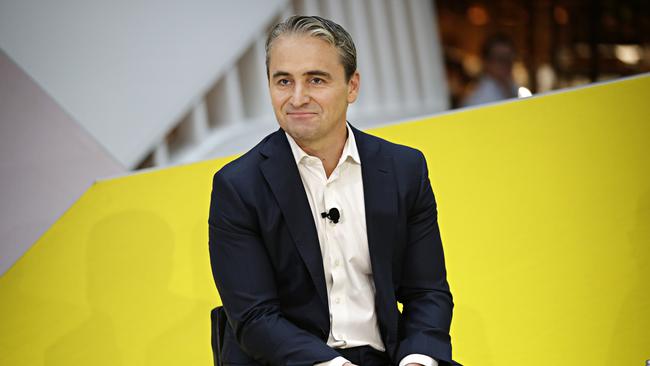CBA breaks the bank on Klarna investment
The value of Commonwealth Bank’s 5 per cent stake in Swedish buy now, pay later group Klarna has surged more than five-fold to $2.7bn.

Business
Don't miss out on the headlines from Business. Followed categories will be added to My News.
Commonwealth Bank’s $US300m ($409m) bet on global buy now, pay later provider Klarna has paid off massively, with a more than five-fold surge in the value of the bank’s 5 per cent stake to $2.7bn.
CBA’s valuation of its minority stake, described in exhaustive detail in the bank’s 2021 annual report, released on Wednesday, capitalises unlisted Klarna at $54bn - a $15bn premium to Square’s $39bn takeover offer for Afterpay earlier this month.
The frothy numbers reflect the market’s assessment of the huge disruptive power of global BNPL platforms on traditional consumer lending.
CBA chief executive Matt Comyn said there was no post-balance date adjustment to the value of the Klarna stake, despite the Afterpay deal occurring on August 2.
The valuation, he said, could therefore appear “conservative”, with Klarna valued at a revenue multiple of 32 compared to more than 40 for Afterpay in the Square takeover.
CBA also used a recent private-equity capital raising by Klarna to back up its valuation.
The bank initially paid $US100m for a 1.8 per cent stake in the Swedish BNPL group before outlying a further $US200m in January last year.
CBA and Klarna jointly fund and have 50:50 ownership rights to Klarna’s Australian and New Zealand businesses.
Mr Comyn also said on Wednesday that Australia needed to “urgently” consider the future of its payments system, as powerful but largely unregulated global technology platforms turn their attention to the local financial services industry.
Commenting on the Afterpay deal, he said CBA’s first priority was to provide its customers with compelling products and services.
“But I do think there are a range of regulatory issues that need to be considered,” he told The Australian.
“Not all Big Tech is created equal - so what sort of financial system do we want over the medium term?
“It’s definitely an area which needs to be reviewed with some urgency.”
Before the Afterpay takeover bid, Mr Comyn voiced his concern to a parliamentary committee about Apple’s escalating power in the payments system through Apple Pay.
He acknowledged there were a number of streams of work underway in government and the parliament to consider options.
However, as technology evolved, it was important to prevent developments likely to create a substantial lessening of competition, most likely through additional legislative powers to designate the biggest platforms, or taking measures to reintroduce competitive tension.
The CBA boss said there could be lessons to be drawn from the experience of the media bargaining code.
Reserve Bank governor Philip Lowe said in response to the issues raised by Mr Comyn that an amendment to enable the RBA to regulate payment “services” rather than “systems” could be part of the answer.
Dr Lowe said the RBA had asked King & Wood Mallesons partner Scott Farrell, who has completed a payments-system for Treasury which is yet to be released, to consider recommending such a reform.
Mr Comyn said on Wednesday he hadn’t seen the Farrell review but understood that it was coming out “soon”.
“I’ve certainly met with Scott Farrell and he has a good understanding of the issues and the landscape,” he said.
“I suspect there will be a number of recommendations and I look forward to getting it.”
As for Dr Lowe’s proposal, the CBA chief said it was one of the issues identified for consideration by the Farrell review.
The current regulatory framework, he said, was “quite narrow and needs to be broadened significantly”.
“We’re very much focused on balancing the customer outcomes as well as the potential customer harm,” Mr Comyn said.
“I think there’s some competition issues in terms of market power, and there’s a range of regulation and legislation which doesn’t apply to a number of companies which are increasingly participating in the financial system.
“That’s not just in Australia but globally, and that would extend into crypto and derivatives.”
Mr Comyn said he broadly agreed with a paper on Big Tech by the central bankers’ club, the Bank for International Settlements.
The paper, launched on the same day as the Afterpay takeover, says Big Tech poses a unique regulatory challenge because its powerful e-commerce and social media businesses enabled firms to quickly overcome traditional barriers to entry, such as lack of scale.
By leveraging reams of data and the transaction patterns of users, platform providers could emerge as serious players in financial services much faster than traditional operators.
“Given the potential for rapid change, the absence of currently dominant platforms should not be a source of comfort for central banks,” the BIS paper says.
“Rather, they should anticipate developments and formulate policy based on possible scenarios where Big Tech initiatives may already have reshaped the payment system, instead of focusing on the market structure of the payment system as it currently stands.”
Originally published as CBA breaks the bank on Klarna investment



